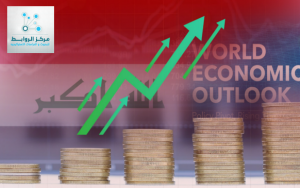BY: Shatha Kalel
The outlook for the Iraqi economy reveals a mix of challenges and opportunities. While there are positive growth projections, particularly in the non-oil sector, Iraq’s economy remains heavily dependent on oil revenues and faces substantial fiscal and structural challenges. Below is a detailed look at the challenges and opportunities facing the Iraqi economy through 2025 and beyond:
Challenges Facing the Iraqi Economy
Dependence on Oil Revenues Iraq’s economy continues to rely heavily on oil, which constitutes a significant portion of its GDP and government revenues. This dependence makes the economy vulnerable to fluctuations in global oil prices. Any drop in oil prices could significantly affect public finances and economic stability.
Fiscal Imbalances and Debt The International Monetary Fund (IMF) has expressed concern about Iraq’s fiscal situation. The country is facing a widening budget deficit, which is expected to reach 7.6% of GDP in 2024, compared to 1.3% in 2023. Government debt is also on the rise, projected to reach 48.2% of GDP in 2024 and 54.6% in 2025. If these imbalances are not addressed through fiscal reforms, they could lead to long-term financial instability.
Global Economic Uncertainty Global economic challenges, including the possibility of lower oil prices or escalating regional conflicts, could negatively affect Iraq’s economic growth. Volatility in international markets, coupled with ongoing geopolitical tensions in the Middle East, creates significant risks for Iraq’s economic outlook.
Inflation and Economic Imbalances Although inflation has decreased in recent years, Iraq remains vulnerable to economic imbalances caused by fiscal expansion and fluctuations in global oil prices. Fiscal expansion, while stimulating growth in the short term, could lead to inflationary pressures and weaken financial stability in the medium term.
Weak Private Sector Development Despite some improvements, Iraq’s private sector remains underdeveloped. The country faces structural issues, including inefficient public services, lack of economic diversification, and underutilized human resources. Unlocking the potential of the private sector is crucial for long-term economic sustainability.
Opportunities for the Iraqi Economy
Growth in the Non-Oil Sector One of the most promising aspects of Iraq’s economic future lies in the growth of the non-oil sector. The country has made progress in diversifying its economy, with notable recovery in sectors such as agriculture, construction, and services. Government focus on economic reforms, particularly in infrastructure and education, could further stimulate this growth.
Improved Internal Stability Since the new government took office in 2022, Iraq has experienced significant improvements in internal stability. This has created a more favorable environment for economic reforms, such as the approval of Iraq’s first-ever three-year budget. With continued political stability, Iraq could attract more foreign investment and boost domestic productivity.
Social and Gender Reforms Iraq has opportunities to increase workforce participation, especially among women. Reforming labor laws and improving access to education could enhance human capital and boost economic productivity. By improving gender equality, Iraq could drive economic growth by tapping into underutilized segments of the population.
Renewed Efforts to Join the World Trade Organization (WTO) Iraq’s ongoing efforts to join the WTO present a significant opportunity for economic integration into the global economy. Membership could increase foreign investment, improve trade relations, and provide access to global markets, which would help diversify the economy and reduce dependence on oil.
Technological Innovation and Infrastructure Investment The growth of technology and infrastructure investments could drive economic expansion beyond the oil sector. Key sectors such as information technology, telecommunications, and renewable energy offer significant growth opportunities. By investing in these areas, Iraq could lay the foundation for a more diversified and sustainable economy in the future.
Support for the Private Sector Structural reforms aimed at improving the business environment and encouraging private sector development are critical for long-term economic growth. Steps to improve governance, reduce bureaucracy, and address challenges in vital sectors such as electricity and public procurement can open new avenues for private investment.
Outlook for 2025 and Beyond
By 2025, Iraq is expected to experience a noticeable recovery, especially with growth in the non-oil sector and increased investment in infrastructure and technology. The projected 5.3% GDP growth in 2025 highlights the potential for stronger performance, assuming the necessary fiscal and structural reforms are implemented. These reforms should focus on improving fiscal discipline, diversifying revenue sources, and enhancing public sector efficiency.
However, Iraq’s economy will remain vulnerable to risks, particularly regarding oil price fluctuations and ongoing regional geopolitical tensions. To mitigate these risks and sustain long-term growth, Iraq needs to focus on diversifying its economy, strengthening its financial reserves, and implementing the necessary structural reforms.
Conclusion
The future of the Iraqi economy depends on addressing its current vulnerabilities while capitalizing on opportunities for growth and diversification. While the country’s reliance on oil revenues remains a major challenge, progress in internal stability, non-oil sector development, and private sector reforms offer hope for a more sustainable economic future. If Iraq can successfully navigate these challenges and implement the necessary reforms, it has the potential to build a more stable and prosperous economy in the years ahead, particularly after 2025.
Economic Unit/North America Office
Al Rawabet Center for Research and Strategic Studies

